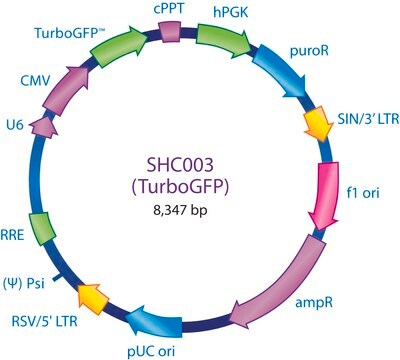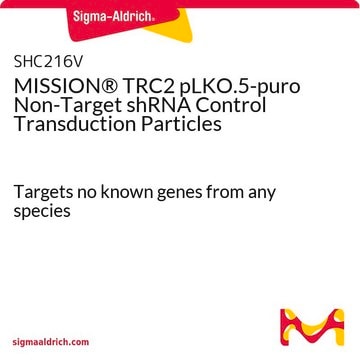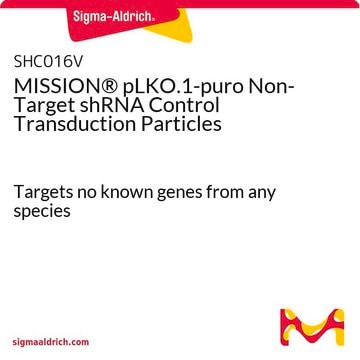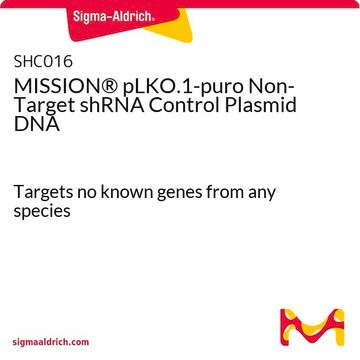추천 제품
유사한 제품을 찾으십니까? 방문 제품 비교 안내
일반 설명
This shRNA non-mammalian control was designed using our Turbo GFP sequence and may cause some knockdown of tGFP. For maximum knockdown of tGFP, please refer to SHC004, SHC004V, SHC004H, SHC204, or SHC204V.
The MISSION TRC2 pLKO-puro Non-Target shRNA Control Transduction Particles are produced from the sequence-verified lentiviral plasmid, TRC2 pLKO-puro Non-Target shRNA (SHC202). This vector is in the TRC2 pLKO-puro plasmid backbone, which contains the WPRE. The vector contains an shRNA insert that does not target human or mouse genes, making it useful as a negative control in experiments using the MISSION TRC2 shRNA library clones.
Unlike murine-based MMLV or MSCV retroviral systems, lentiviral-based particles permit efficient infection and integration of the construct into differentiated and non-dividing cells, such as neurons and dendritic cells, overcoming low transfection and integration difficulties when using these cell lines. Self-inactivating replication incompetent viral particles are produced in packaging cells (HEK293T) by co-transfection with compatible packaging plasmids.
In addition, the lentiviral transduction particles are pseudotyped with an envelope G glycoprotein from Vesicular Stomatitis Virus (VSV-G), allowing transduction of a wide variety of mammalian cells. 200 μl of 106 TU/ml (via p24 titering assay) lentiviral particles are provided as frozen stock.
When conducting experiments using MISSION shRNA clones, the proper controls should be a key element of your experimental design to allow for accurate interpretation of knockdown results.
The MISSION TRC2 pLKO-puro Non-Target shRNA Control Transduction Particles are produced from the sequence-verified lentiviral plasmid, TRC2 pLKO-puro Non-Target shRNA (SHC202). This vector is in the TRC2 pLKO-puro plasmid backbone, which contains the WPRE. The vector contains an shRNA insert that does not target human or mouse genes, making it useful as a negative control in experiments using the MISSION TRC2 shRNA library clones.
Unlike murine-based MMLV or MSCV retroviral systems, lentiviral-based particles permit efficient infection and integration of the construct into differentiated and non-dividing cells, such as neurons and dendritic cells, overcoming low transfection and integration difficulties when using these cell lines. Self-inactivating replication incompetent viral particles are produced in packaging cells (HEK293T) by co-transfection with compatible packaging plasmids.
In addition, the lentiviral transduction particles are pseudotyped with an envelope G glycoprotein from Vesicular Stomatitis Virus (VSV-G), allowing transduction of a wide variety of mammalian cells. 200 μl of 106 TU/ml (via p24 titering assay) lentiviral particles are provided as frozen stock.
When conducting experiments using MISSION shRNA clones, the proper controls should be a key element of your experimental design to allow for accurate interpretation of knockdown results.
When conducting experiments using MISSION® shRNA clones, the proper controls should be a key element of your experimental design to allow for accurate interpretation of knockdown results. The MISSION Control Transduction Particles are a critical positive control to monitor transduction efficiency.
To see more application data, protocols, vector maps visit sigma.com/shrna.
To see more application data, protocols, vector maps visit sigma.com/shrna.
애플리케이션
Small interfering RNAs (siRNAs) expressed from short hairpin RNAs (shRNAs) are a powerful way to mediate gene specific RNA interference (RNAi) in mammalian cells. The MISSION product line is based on a viral vector-based RNAi library against annotated mouse and human genes. shRNAs that generate siRNAs intracellularly are expressed from amphotropic lentivirus viral particles, allowing screening in a wide range of mammalian cell lines. In these cell lines, MISSION shRNA clones permit rapid, cost efficient loss-of-function and genetic interaction screens.
To see more application data, protocols, vector maps visit sigma.com/shrna.
법적 정보
MISSION is a registered trademark of Merck KGaA, Darmstadt, Germany
Storage Class Code
12 - Non Combustible Liquids
WGK
WGK 3
Flash Point (°F)
Not applicable
Flash Point (°C)
Not applicable
가장 최신 버전 중 하나를 선택하세요:
시험 성적서(COA)
Lot/Batch Number
이미 열람한 고객
Anaïs Pujals et al.
Autophagy, 11(12), 2275-2287 (2015-11-14)
The Epstein-Barr virus (EBV) is associated with various lymphoproliferative disorders and lymphomas. We have previously demonstrated that treating wild-type TP53-expressing B cell lines with the TP53 pathway activator nutlin-3 induced apoptosis in EBV-negative and EBV-positive latency I cells whereas EBV-positive
Claire Deligne et al.
Cancer immunology research, 8(3), 368-382 (2020-01-17)
The interplay between cancer cells and immune cells is a key determinant of tumor survival. Here, we uncovered how tumors exploit the immunomodulatory properties of the extracellular matrix to create a microenvironment that enables their escape from immune surveillance. Using
R Zufferey et al.
Journal of virology, 73(4), 2886-2892 (1999-03-12)
The expression of genes delivered by retroviral vectors is often inefficient, a potential obstacle for their widespread use in human gene therapy. Here, we explored the possibility that the posttranscriptional regulatory element of woodchuck hepatitis virus (WPRE) might help resolve
Caroline Spenlé et al.
Cancer immunology research, 8(9), 1122-1138 (2020-07-16)
Inherent immune suppression represents a major challenge in the treatment of human cancer. The extracellular matrix molecule tenascin-C promotes cancer by multiple mechanisms, yet the roles of tenascin-C in tumor immunity are incompletely understood. Using a 4NQO-induced oral squamous cell
Mariano J Alvarez et al.
Nature genetics, 50(7), 979-989 (2018-06-20)
We introduce and validate a new precision oncology framework for the systematic prioritization of drugs targeting mechanistic tumor dependencies in individual patients. Compounds are prioritized on the basis of their ability to invert the concerted activity of master regulator proteins
자사의 과학자팀은 생명 과학, 재료 과학, 화학 합성, 크로마토그래피, 분석 및 기타 많은 영역을 포함한 모든 과학 분야에 경험이 있습니다..
고객지원팀으로 연락바랍니다.









